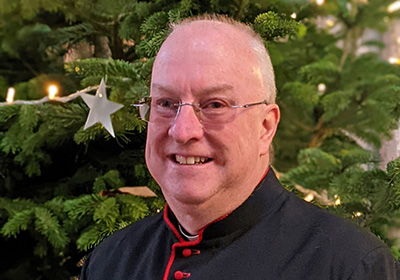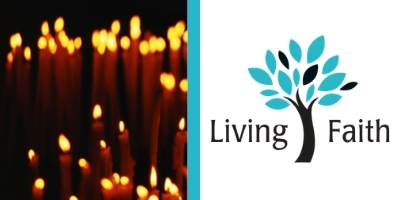In the second of our specially commissioned ‘Light in the darkness’ reflections for Advent, Gordon Giles suggests that in a topsy-turvy year such as this, it’s more important than ever to embrace this season of preparation and hope…
22 November 2020
We ourselves, who have the first fruits of the Spirit, groan inwardly while we wait for adoption, the redemption of our bodies. For in hope we were saved. Now hope that is seen is not hope. For who hopes for what is seen? But if we hope for what we do not see, we wait for it with patience.
Romans 8:23–25 (NRSV)
Twice a year, in March and October, we change our clocks, moving them an hour forward or back. It is a strange but normal activity, one that is seasonal and marks the division of the year. It is also beyond our control, but one which we accept, complying without complaint or resistance.
Changing the clocks is comforting in October, as we gain an extra hour’s sleep. But then we receive chronological payback in March, when we have a shorter night as the clocks go forward.
A spring of darkness
It is only a few weeks ago that we turned our clocks back to Greenwich Mean Time. As we did so, we remembered what we were doing when we put them forward in March.
The coronavirus had arrived: people had begun to die in large numbers and lockdown was imposed. Easter was virtually cancelled, or rather it became virtual. Lent courses were abandoned, and while some entered homemade prisons of poverty and isolation, sustained by the kindness of others, we clapped for the NHS and hunkered down or went for walks.
The clocks leapt forward into a spring of darkness: a premature Advent.
Some lit candles, but the light of hope was burning very thin indeed, and it went out for many. Suffering and death became a part of life, for some a way of life. The clocks had leapt forward into a spring of darkness: a premature Advent. It has been Advent ever since.
Since then, we have been preparing for this year’s Advent. And when we turned the hand of the clocks back a few weeks ago, we also renewed the trepidation, fear and resignation of March. More gloom and doom has been added to the mix, because we have seen this before – the curve rising, the number of infections, the cases increasing, the death toll mounting. We are back where we started in March. It’s like turning the clock back, and it makes us weary as well as apprehensive.
With or without chocolate
We are used to commencing Advent four weeks before Christmas, as a spiritual exercise. Trying to ‘observe’ or ‘keep’ Advent has become an increasingly difficult, even countercultural task. December 1st marks the first door opening on Advent calendars, with or without chocolate. It is the green light on the ‘Ready. Steady… Christmas!’ race to 25 December in the fast lane of the Christmas shopping highway.
Trying to ‘observe’ or ‘keep’ Advent has become an increasingly difficult, even countercultural task.
It takes a certain presence of mind, determination and even belligerence to cling on to the notion of Advent as a preparation for the second coming rather than the run-up to Christmas. With Christmas carols serenading this trajectory, Advent is often a brief or non-existent season, shoved aside by all sorts of liquor, ice and luxury.
A different scenario
This year we have a different scenario. For we have been living Advent not as a spiritual exercise, but as a living, breathing, dying, suffocating, real life-and-death phenomenon. We don’t need Advent this year.
We must not sleepwalk through these challenging, precious, profound times.
Oh yes, we do! We need it more than ever. For reality must be reflected upon, and we must not sleepwalk through these challenging, precious, profound times. There is much to learn and upon which to reflect.
The spiritual discipline of Advent calls us to reflect on the four last things: death, judgement, heaven and hell. Nothing focuses the mind more than death, and whatever judgement, hell and heaven might be, death is not debatable. Around 150,000 people die every day worldwide. The coronavirus has increased this and brought death into our homes daily for the past six months or so.
Waiting in expectation and hope
With the virus comes trepidation, fear and despair, but also hope and expectation. Advent is not only about the four last things, it is also about waiting in expectation and hope.
The whole world longs for redemption from the coronavirus. We are waiting for a cure or vaccine. We expect one to be forthcoming, which means that we are living in some sort of hope: hope against darkness, light amid fear.
We are waiting for a cure or vaccine, which means that we are living in some sort of hope.
This hope is a metaphor for what Advent is truly about. Advent is not really about having a cure for a pernicious disease that has ravaged the earth and brought fear and grief. Advent is about an expectant and patient waiting upon God, in cautious anticipation of the return of our Lord and in joyful preparation for the celebration of incarnation of the Word made flesh: Jesus Christ.
The four last things might give us a starting place if we take the coronavirus as our spiritual interlocutor. What does it say to us about death (in the wake of so much)? What does it tell us about judgement (particularly in relation to creation groaning under human sin)? What does it show us about the hope of heaven? And what does it reveal about hell (on earth, or elsewhere)?
Ponder these things as you prepare to welcome the babe of Bethlehem into the home of your heart and the heart your homes. As we wait for, anticipate, even expect imminent relief from the ravages and restrictions wreaked upon us by the coronavirus, presaged by the real-life Advent we have been living through for most of this year, let us remember the deeper Advent waiting in anticipation, expectation and hope of the redemption of everyone and everything in Jesus Christ.

Gordon Giles is canon chancellor of Rochester Cathedral. He is the author of several books, including Comings and Goings (2015) and At Home in Lent (2018). His At Home in Advent is BRF’s 2020 Advent book.

BRF Advent books
BRF offers a range of Advent resources for every taste, including:
Messy Christmas Pack
The Messy Christmas Pack is here to support Messy Churches through Advent, over Christmas and towards Epiphany.
In this pack you’ll find two resources to help Messy Church leaders run festive sessions with ease, along with a special gift to bring Messy Church families together this Christmas.
Because of this year’s special circumstances there are also adaptations of many of the activities, so you can use them at home.

Black Friday
Black Friday can be a jostling riot as people elbow their way to the biggest bargains, but this year will be different for reasons we all know. As you gear up for Christmas shopping, either online or on socially distanced high streets, don’t forget there are some easy ways to support BRF at no extra cost to you.
